Schmitt C.B. (ed.) The Cambridge History of Renaissance Philosophy
Подождите немного. Документ загружается.

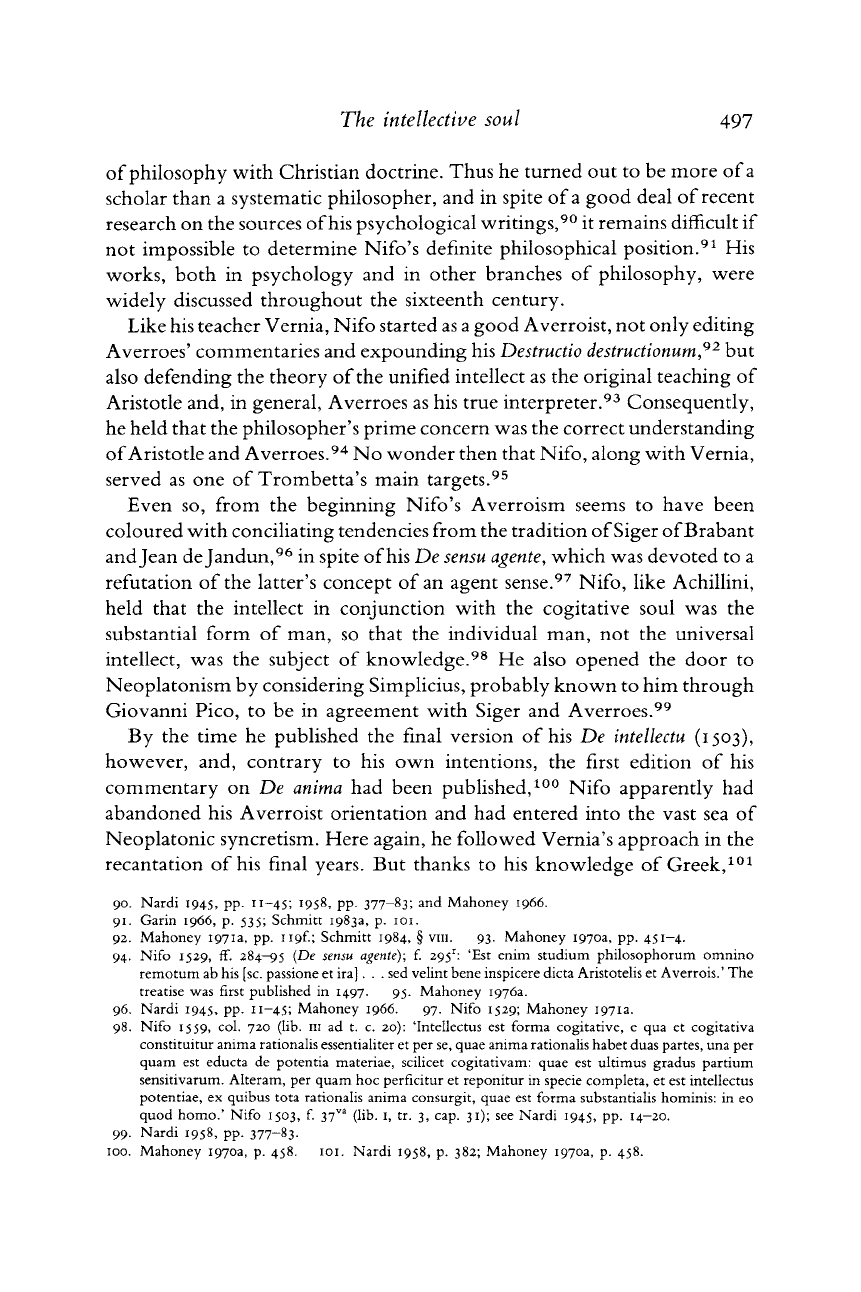
The
intellective
soul
497
of
philosophy with
Christian
doctrine.
Thus he turned out to be
more
of
a
scholar
than a systematic philosopher, and in spite of
a
good deal of
recent
research
on the
sources
of
his psychological writings,
90
it
remains
difficult if
not
impossible to determine Nifo's definite philosophical position.
91
His
works,
both in psychology and in
other
branches
of philosophy, were
widely discussed throughout the sixteenth
century.
Like
his
teacher
Vernia,
Nifo
started
as
a
good
Averroist,
not only editing
Averroes'
commentaries
and expounding his
Destructio
destructionum
92
but
also
defending the theory of
the
unified intellect as the original teaching of
Aristotle
and, in general,
Averroes
as his
true
interpreter.
93
Consequently,
he
held
that
the philosopher's prime
concern
was the
correct
understanding
of
Aristotle
and
Averroes.
94
No wonder then
that
Nifo, along with
Vernia,
served
as one of
Trombetta's
main
targets.
95
Even
so, from the beginning Nifo's Averroism seems to have been
coloured
with conciliating tendencies from the
tradition
of
Siger
of
Brabant
and
Jean
de
Jandun,
96
in spite
of
his De
sensu
agente,
which was devoted to a
refutation
of the
latter's
concept of an agent sense.
97
Nifo, like Achillini,
held
that
the intellect in conjunction with the cogitative soul was the
substantial
form of man, so
that
the individual man, not the universal
intellect,
was the subject of knowledge.
98
He also opened the door to
Neoplatonism
by considering Simplicius,
probably
known to him through
Giovanni
Pico,
to be in agreement with Siger and
Averroes.
99
By
the time he published the final version of his De
intellectu
(1503),
however,
and,
contrary
to his own intentions, the first edition of his
commentary
on De
anima
had been published,
100
Nifo apparently had
abandoned
his Averroist orientation and had entered into the vast sea of
Neoplatonic
syncretism.
Here
again, he followed Vernia's
approach
in the
recantation
of his final
years.
But thanks to his knowledge of Greek,
101
90. Nardi 1945, pp. n-45; 1958, pp. 377-83; and Mahoney 1966.
91.
Garin 1966, p. 535; Schmitt 1983a, p. 101.
92. Mahoney
1971a,
pp. H9f.; Schmitt 1984, § vm. 93. Mahoney 1970a, pp. 451-4.
94. Nifo 1529, ff.
284—95
(De
sensu
agente);
f. 295
r
: 'Est
enim
studium philosophorum omnino
remotum ab his [sc.
passione
et ira]. . . sed velint bene inspicere dicta Aristotelis et Averrois.' The
treatise was first published in 1497. 95. Mahoney 1976a.
96. Nardi 1945, pp. n-45; Mahoney 1966. 97. Nifo 1529; Mahoney
1971a.
98. Nifo 1559, col. 720 (lib.
HI
ad t. c. 20): 'Intellectus est forma cogitative, e qua et cogitativa
constituitur anima rationalis
essentialiter
et per se, quae anima rationalis habet duas partes, una per
quam est educta de potentia materiae, scilicet cogitativam: quae est ultimus gradus partium
sensitivarum. Alteram, per quam hoc perficitur et reponitur in
specie
completa, et est intellectus
potentiae, ex quibus tota rationalis anima consurgit, quae est forma substantialis hominis: in eo
quod homo.' Nifo 1503, f. 37
va
(lib. 1, tr. 3, cap. 31); see Nardi 1945, pp. 14-20.
99. Nardi 1958, pp. 377-83-
100. Mahoney 1970a, p. 458. 101. Nardi 1958, p. 382; Mahoney 1970a, p. 458.
Cambridge Histories Online © Cambridge University Press, 2008
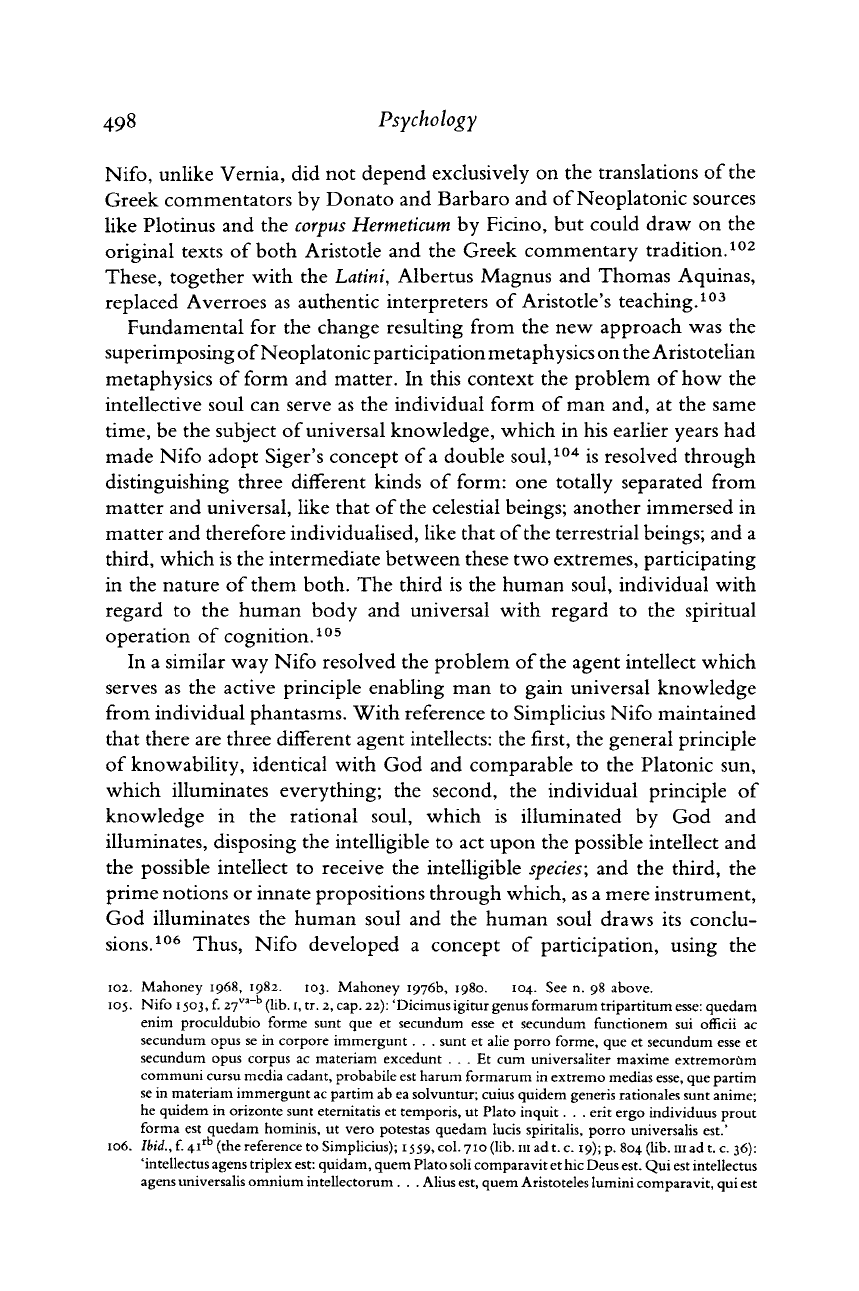
498
Psychology
Nifo, unlike Vernia, did not depend exclusively on the translations of the
Greek
commentators by Donato and
Barbaro
and of Neoplatonic sources
like
Plotinus and the
corpus
Hermeticum by Ficino, but could draw on the
original texts of both Aristotle and the Greek commentary tradition.
102
These, together with the
Latini,
Albertus Magnus and Thomas Aquinas,
replaced
Averroes as authentic interpreters of Aristotle's teaching.
103
Fundamental
for the change resulting from the new approach was the
superimposing
of
Neoplatonic
participation
metaphysics on the Aristotelian
metaphysics of form and
matter.
In this context the problem of how the
intellective soul can serve as the individual form of man and, at the same
time,
be the subject of universal knowledge, which in his earlier years had
made
Nifo
adopt Siger's concept of
a
double soul,
104
is resolved through
distinguishing three different kinds of form: one totally separated from
matter
and universal,
like
that of the celestial beings; another immersed in
matter
and therefore individualised,
like
that
of
the
terrestrial
beings; and a
third,
which is the intermediate between these two extremes, participating
in the nature of them both. The third is the human soul, individual with
regard
to the human body and universal with regard to the spiritual
operation of cognition.
105
In a similar way
Nifo
resolved the problem of the agent intellect which
serves as the active principle enabling man to gain universal knowledge
from
individual phantasms. With reference to Simplicius
Nifo
maintained
that
there are three different agent intellects: the first, the general principle
of
knowability, identical with God and comparable to the Platonic sun,
which illuminates everything; the second, the individual principle of
knowledge in the rational soul, which is illuminated by God and
illuminates, disposing the
intelligible
to act upon the possible intellect and
the possible intellect to receive the
intelligible
species;
and the third, the
prime
notions or innate propositions through which, as a mere instrument,
God illuminates the human soul and the human soul draws its conclu-
sions.
106
Thus,
Nifo
developed a concept of participation,
using
the
102.
Mahoney
1968, 1982. 103.
Mahoney
1976b, 1980. 104. See n. 98
above.
105.
Nifo
1503, f. 27
va_b
(lib.
1,
tr. 2, cap. 22):
'Dicimus
igitur
genus
formarum
tripartitum
esse:
quedam
enim
proculdubio
forme
sunt
que et
secundum
esse
et
secundum functionem
sui
officii
ac
secundum
opus
se in
corpore
immergunt
. . .
sunt
et
alie
porro
forme,
que et
secundum
esse
et
secundum
opus
corpus
ac
materiam
excedunt
. . . Et cum
universaliter
maxime
extremorum
communi
cursu
media
cadant,
probabile
est
harum formarum
in
extremo
medias
esse,
que
partim
se in
materiam immergunt
ac
partim
ab ea
solvuntur;
cuius
quidem
generis
rationales
sunt
anime;
he
quidem
in
orizonte
sunt
eternitatis
et
temporis,
ut
Plato
inquit.
. .
erit
ergo
individuus
prout
forma
est
quedam
hominis,
ut
vero
potestas
quedam
lucis
spiritalis,
porro
universalis
est.'
106. Ibid., f. 41
th
(the
reference
to
Simplicius);
1559, col. 710 (lib.
111
ad t. c. 19); p. 804 (lib.
111
ad t. c. 36):
'intellectus
agens
triplex
est:
quidam,
quern
Plato
soli
comparavit
et hie
Deus
est. Qui est
intellectus
agens
universalis omnium
intellectorum.
. .
Alius
est,
quern
Aristoteles
lumini
comparavit,
qui est
Cambridge Histories Online © Cambridge University Press, 2008
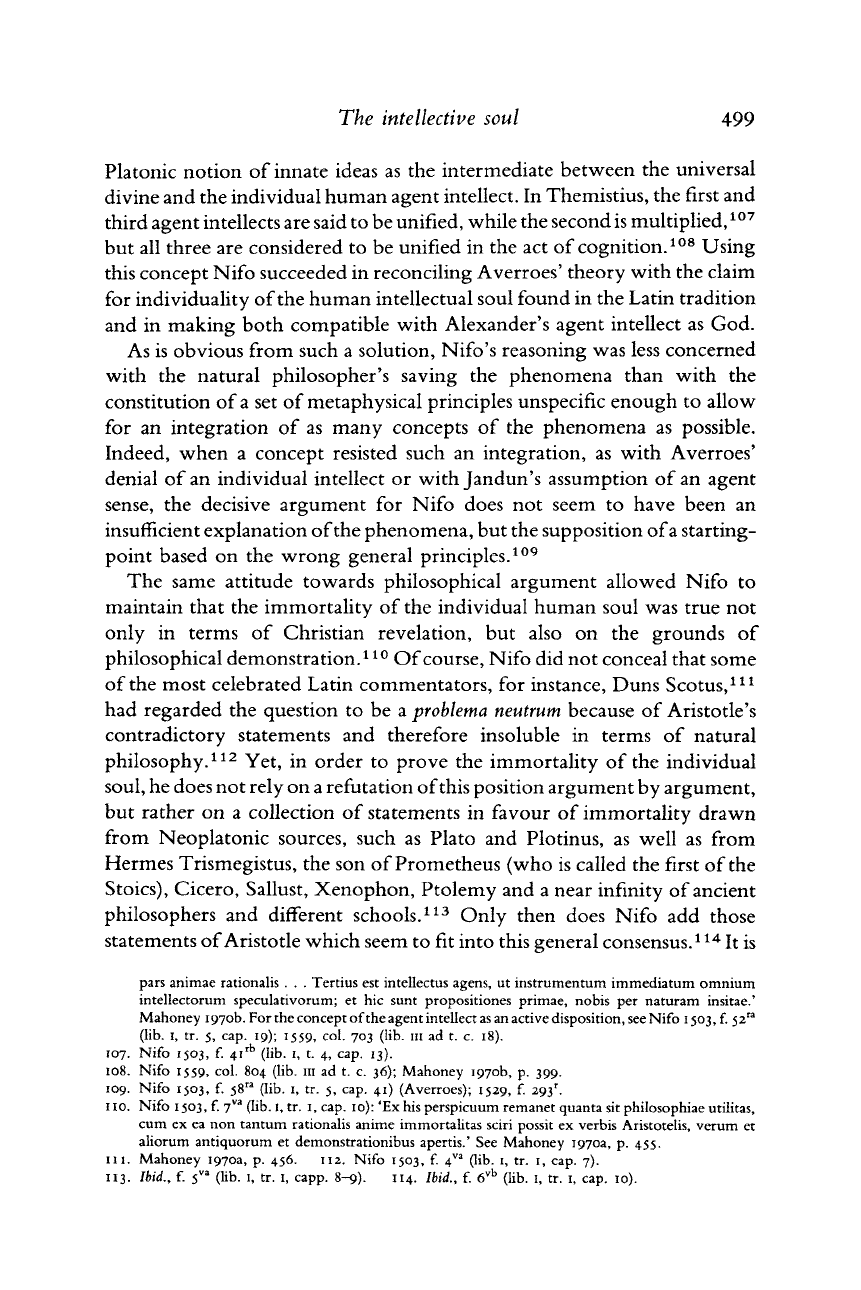
The
intellective
soul
499
Platonic
notion of innate ideas as the intermediate between the universal
divine and the individual human agent intellect. In Themistius, the first and
third
agent intellects
are
said to be unified,
while
the second is multiplied,
107
but all three are considered to be unified in the act of cognition.
108
Using
this concept
Nifo
succeeded in reconciling
Averroes'
theory with the claim
for
individuality
of
the
human intellectual soul found in the Latin tradition
and
in making both compatible with Alexander's agent intellect as God.
As is obvious from such a solution,
Nifo's
reasoning was
less
concerned
with the natural philosopher's saving the phenomena than with the
constitution of
a
set of metaphysical principles unspecific enough to allow
for
an integration of as many concepts of the phenomena as possible.
Indeed, when a concept resisted such an integration, as with Averroes'
denial of an individual intellect or with
Jandun's
assumption of an agent
sense, the decisive argument for
Nifo
does not seem to have been an
insufficient explanation
of
the
phenomena, but the supposition
of
a
starting-
point based on the wrong general principles.
109
The
same attitude towards philosophical argument allowed
Nifo
to
maintain
that the immortality of the individual human soul was
true
not
only in terms of Christian revelation, but also on the grounds of
philosophical demonstration.
110
Of
course,
Nifo
did not conceal that some
of
the most celebrated Latin commentators, for instance, Duns Scotus,
111
had
regarded the question to be a
problema
neutrum because of Aristotle's
contradictory
statements and therefore insoluble in terms of natural
philosophy.
112
Yet, in
order
to prove the immortality of the individual
soul, he does not rely on
a
refutation
of
this position
argument
by argument,
but
rather
on a collection of statements in favour of immortality drawn
from
Neoplatonic sources, such as Plato and Plotinus, as
well
as from
Hermes
Trismegistus, the son
of
Prometheus
(who is called the first of the
Stoics),
Cicero,
Sallust, Xenophon, Ptolemy and a near infinity of ancient
philosophers and different schools.
113
Only then does
Nifo
add those
statements
of
Aristotle
which seem to fit into this general consensus.
114
It is
pars
animae
rationalis
. . . Tertius est
intellectus
agens,
ut
instrumentum
immediatum
omnium
intellectorum
speculativorum;
et hie
sunt
propositiones
primae,
nobis
per
naturam
insitae.'
Mahoney 1970b. For the
concept
of the
agent
intellect
as an
active
disposition,
see
Nifo
1503, f. 52"
(lib. 1, tr. 5, cap. 19); 1559, col. 703 (lib. in ad t. c. 18).
107.
Nifo
1503, f.
4i
rb
(lib. 1, t. 4, cap. 13).
108.
Nifo
1559» col. 804 (lib. in ad t. c. 36); Mahoney 1970b, p. 399.
109.
Nifo
1503, f. 58" (lib. 1, tr. 5, cap. 41) (Averroes); 1529, f.
293
r
.
110.
Nifo
1503, f. 7
va
(lib. 1, tr. 1, cap. 10): 'Ex his
perspicuum
remanet
quanta sit
philosophiae
utilitas,
cum ex ea non
tantum
rationalis
anime
immortalitas
sciri
possit
ex
verbis
Aristotelis,
verum
et
aliorum
antiquorum
et
demonstrationibus
apertis.'
See Mahoney 1970a, p. 455.
in. Mahoney 1970a, p. 456. 112.
Nifo
1503, f. 4
va
(lib. 1, tr. 1, cap. 7).
113.
Ibid., f. 5
va
(lib. 1, tr. 1, capp. 8-9). 114. Ibid., f. 6
vb
(lib. 1, tr. 1, cap. 10).
Cambridge Histories Online © Cambridge University Press, 2008
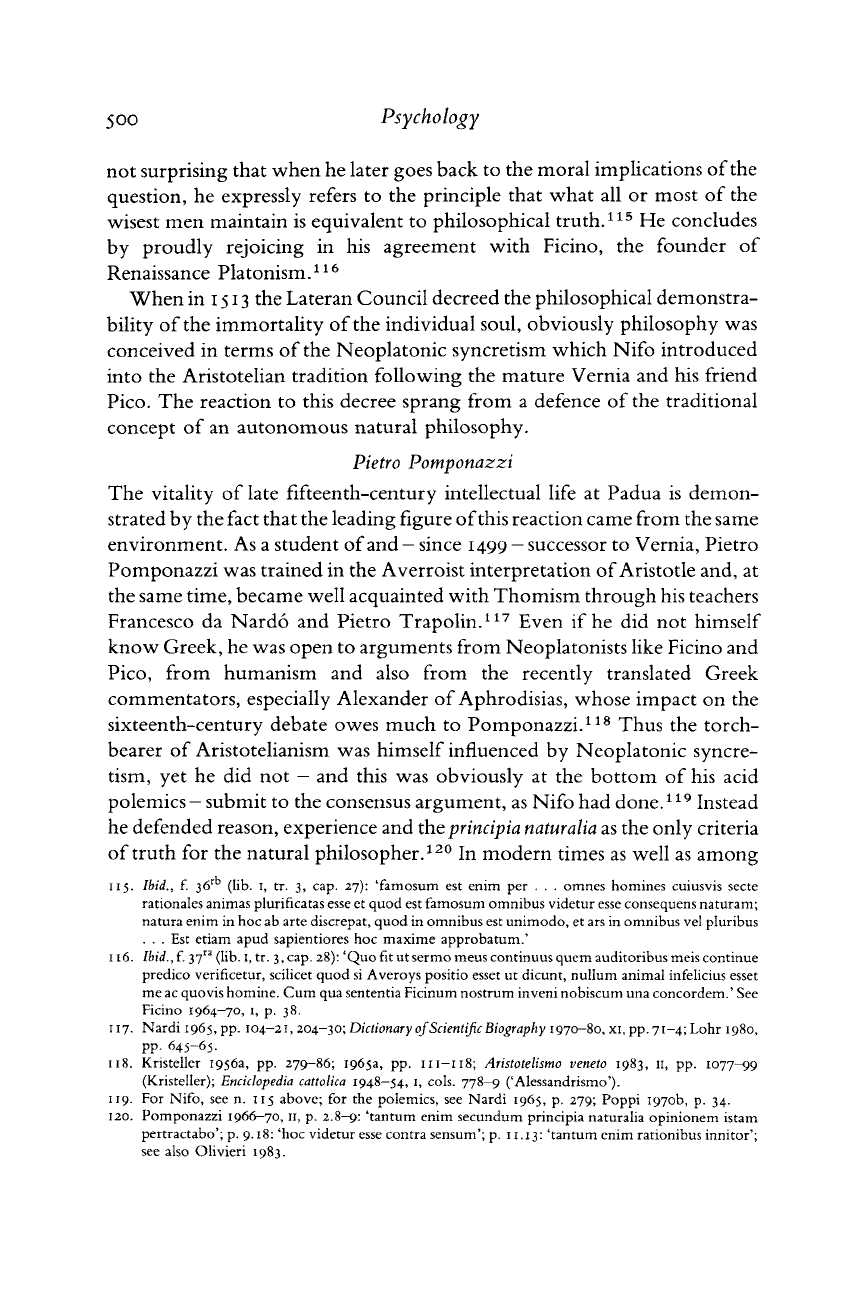
500
Psychology
not surprising that
when
he later
goes
back to the moral implications
of
the
question, he expressly refers to the principle that what all or most of the
wisest
men maintain is equivalent to philosophical
truth.
115
He concludes
by proudly rejoicing in his agreement
with
Ficino, the founder of
Renaissance Platonism.
116
When in
1513
the
Lateran
Council decreed the philosophical demonstra-
bility
of the immortality of the individual soul,
obviously
philosophy was
conceived in terms of the Neoplatonic syncretism which
Nifo
introduced
into the Aristotelian tradition
following
the mature Vernia and his friend
Pico.
The reaction to this decree sprang from a defence of the traditional
concept of an autonomous natural philosophy.
Pietro
Pomponazzi
The vitality of late fifteenth-century intellectual
life
at Padua is demon-
strated
by the fact that the leading figure
of
this reaction came from the same
environment. As a student
of
and
—
since
1499
—
successor to Vernia, Pietro
Pomponazzi was trained in the Averroist interpretation
of
Aristotle and, at
the same time, became
well
acquainted
with
Thomism through his teachers
Francesco
da Nardo and Pietro Trapolin.
117
Even if he did not himself
know Greek, he was open to arguments from Neoplatonists
like
Ficino and
Pico,
from humanism and also from the recently translated Greek
commentators,
especially Alexander of Aphrodisias,
whose
impact on the
sixteenth-century debate
owes
much to Pomponazzi.
118
Thus the
torch-
bearer
of Aristotelianism was himself influenced by Neoplatonic syncre-
tism, yet he did not
—
and this was
obviously
at the bottom of his acid
polemics
—
submit to the consensus argument, as
Nifo
had done.
119
Instead
he defended reason, experience and the
principia
naturalia
as the only
criteria
of
truth
for the natural philosopher.
120
In modern times as
well
as among
115.
Ibid., f.
36
rb
(lib. 1, tr. 3, cap. 27):
'famosum
est
enim
per . . .
omnes
homines
cuiusvis
secte
rationales
animas
plurificatas
esse
et
quod
est
famosum
omnibus
videtur
esse
consequens
naturam;
natura
enim
in hoc ab
arte discrepat,
quod
in
omnibus
est
unimodo,
et ars in
omnibus
vel
pluribus
.
. . Est
etiam
apud
sapientiores
hoc
maxime
approbatum.'
116.
Ibid., f. 37" (lib.
1,
tr. 3, cap. 28): 'Quofit
utsermo
meus
continuusquern
auditoribusmeis
continue
predico
verificetur,
scilicet
quod
si Averoys
positio
esset
ut
dicunt,
nullum
animal
infelicius
esset
me ac
quovis
homine.
Cum qua
sententia
Ficinum
nostrum
inveni
nobiscum
una
concordem.'
See
Ficino
1964-70,
1, p. 38.
117.
Nardi
1965, pp. 104-21,
204-30;
Dictionary
of
Scientific
Biography
1970-80,
xi, pp. 71-4; Lohr 1980,
pp.
645-65.
118.
Kristeller
1956a,
pp.
279-86;
1965a,
pp.
111-118;
Aristotelismo veneto 1983, 11, pp.
1077-99
(Kristeller);
Enciclopedia cattolica
1948-54,
1,
cols.
778-9
('Alessandrismo').
119.
For
Nifo,
see n. 115
above;
for the
polemics,
see
Nardi
1965, p. 279;
Poppi
1970b, p. 34.
120.
Pomponazzi
1966-70,
11, p.
2.8-9:
'tantum
enim
secundum
principia
naturalia
opinionem
istam
pertractabo';
p. 9.18: 'hoc
videtur
esse
contra
sensum';
p.
11.13:
'tantum
enim
rationibus
innitor';
see
also
Olivieri 1983.
Cambridge Histories Online © Cambridge University Press, 2008
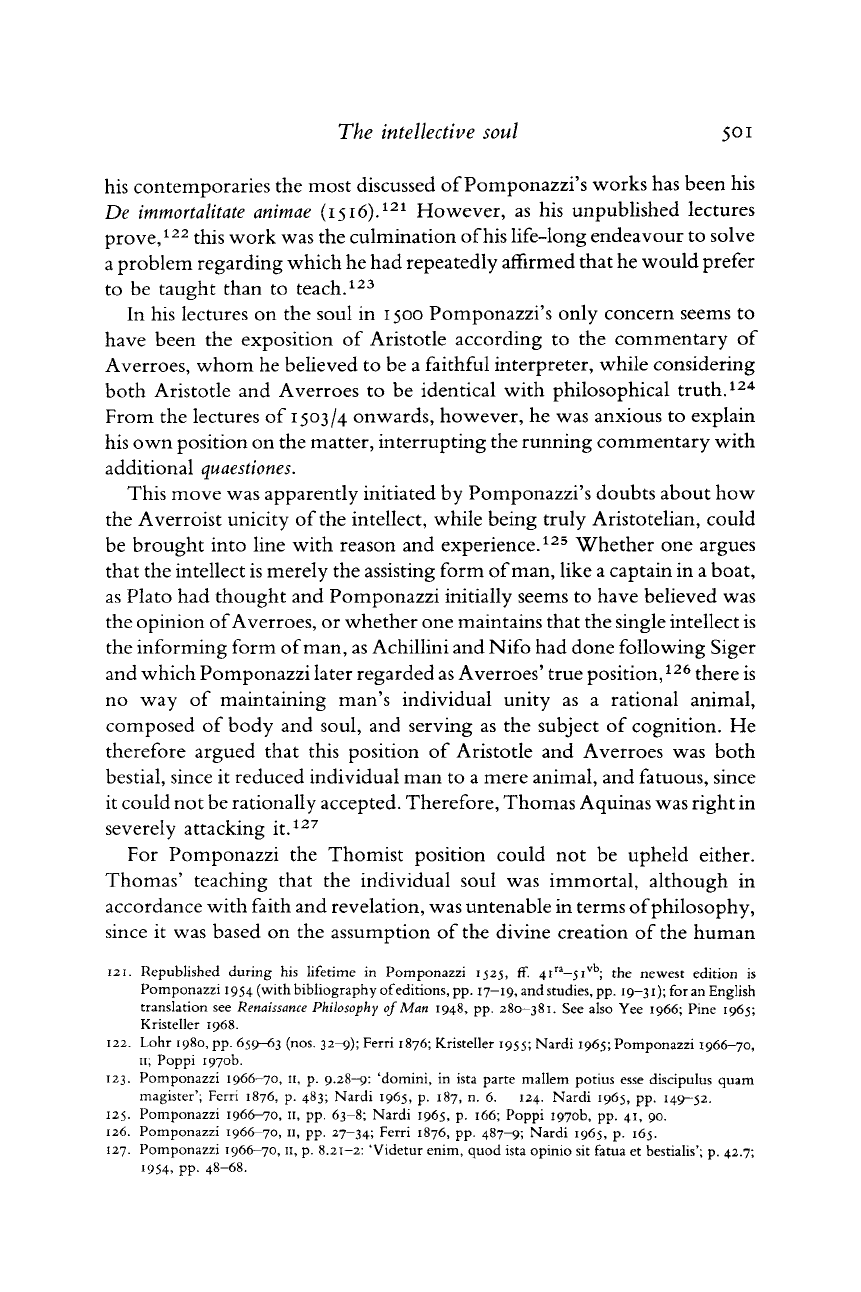
The intellective soul
501
his contemporaries the most discussed
of
Pomponazzi's works has been his
De
immortalitate animae
(1516).
121
However, as his unpublished lectures
prove,
122
this work was the culmination
of
his life-long endeavour to solve
a problem regarding which he had repeatedly affirmed
that
he would prefer
to be taught
than
to teach.
123
In his lectures on the soul in 1500 Pomponazzi's only concern seems to
have been the exposition of Aristotle according to the commentary of
Averroes,
whom he believed to be a faithful interpreter, while considering
both Aristotle and Averroes to be identical with philosophical
truth.
124
From the lectures of 1503/4 onwards, however, he was anxious to explain
his own position on the
matter,
interrupting the running commentary with
additional quaestiones.
This
move was apparently initiated by Pomponazzi's doubts about how
the Averroist unicity of the intellect, while being truly Aristotelian, could
be brought into line with reason and experience.
125
Whether one argues
that
the intellect is merely the assisting form
of
man, like a captain in a boat,
as Plato had thought and Pomponazzi initially seems to have believed was
the opinion
of
Averroes,
or whether one maintains
that
the single intellect is
the informing form
of
man, as
Achillini
and
Nifo
had done
following
Siger
and which Pomponazzi later regarded as Averroes'
true
position,
126
there
is
no way of maintaining man's individual unity as a rational animal,
composed of body and soul, and serving as the subject of cognition. He
therefore argued
that
this position of Aristotle and Averroes was both
bestial, since it reduced individual man to a mere animal, and fatuous, since
it could not be rationally accepted. Therefore, Thomas Aquinas was right in
severely
attacking it.
127
For Pomponazzi the Thomist position could not be upheld either.
Thomas'
teaching
that
the individual soul was immortal, although in
accordance with faith and revelation, was untenable in terms
of
philosophy,
since it was based on the assumption of the divine creation of the human
121.
Republished
during
his
lifetime
in
Pomponazzi
1525, ff.
4i
ra
-5i
vb
;
the
newest edition
is
Pomponazzi
1954
(with
bibliography
of
editions,
pp. 17-19, and
studies,
pp. 19-31); for an
English
translation
see Renaissance Philosophy of Man 1948, pp.
280-381.
See
also
Yee 1966;
Pine
1965;
Kristeller
1968.
122.
Lohr
1980, pp.
659-63
(nos.
32-9);
Ferri
1876;
Kristeller
1955;
Nardi
1965;
Pomponazzi 1966-70,
11;
Poppi
1970b.
123.
Pomponazzi 1966-70,
11, p.
9.28—9:
'domini,
in
ista
parte
mallem
potius
esse
discipulus
quam
magister';
Ferri
1876, p. 483;
Nardi
1965, p. 187, n. 6. 124.
Nardi
1965, pp.
149-52.
125.
Pomponazzi 1966-70,
11, pp. 63-8;
Nardi
1965, p. 166;
Poppi
1970b,
pp. 41, 90.
126.
Pomponazzi 1966-70,
11, pp.
27-34;
Ferri
1876, pp.
487-9;
Nardi
1965, p. 165.
127.
Pomponazzi
1966-70,11,
p.
8.21-2:
'Videtur
enim,
quod
ista
opinio
sit
fatua
et
bestialis';
p. 42.7;
1954, pp.
48-68.
Cambridge Histories Online © Cambridge University Press, 2008
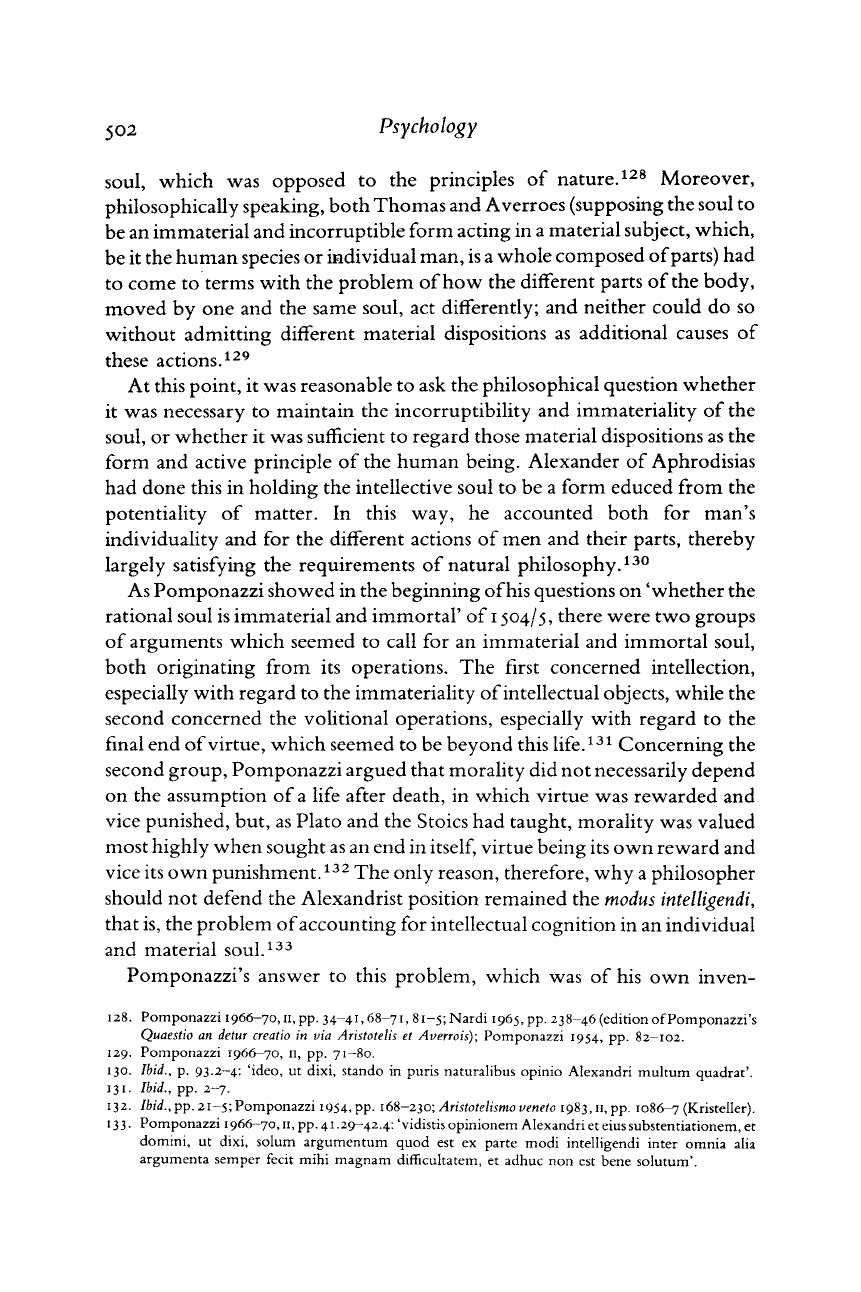
502
Psychology
soul,
which
was
opposed
to the
principles
of
nature.
128
Moreover,
philosophically
speaking, both Thomas
and
Averroes (supposing
the
soul
to
be
an
immaterial
and
incorruptible form acting
in a
material subject, which,
be
it the
human species
or
individual man, is
a
whole composed
of
parts)
had
to come
to
terms with
the
problem
of
how
the
different
parts
of the
body,
moved
by one and the
same soul,
act
differently;
and
neither could
do so
without admitting different material dispositions
as
additional causes
of
these actions.
129
At
this point,
it
was reasonable
to ask the
philosophical question whether
it
was
necessary
to
maintain
the
incorruptibility
and
immateriality
of the
soul,
or
whether
it
was sufficient
to
regard those material dispositions
as the
form
and
active principle
of the
human being. Alexander
of
Aphrodisias
had done this
in
holding
the
intellective soul
to be a
form educed from
the
potentiality
of
matter.
In
this
way, he
accounted both
for
man's
individuality
and for the
different actions
of men and
their parts, thereby
largely
satisfying
the
requirements
of
natural philosophy.
130
As
Pomponazzi showed
in the
beginning
of
his questions
on
'whether
the
rational soul
is
immaterial
and
immortal'
of
1504/5,
there
were
two
groups
of
arguments which seemed
to
call
for an
immaterial
and
immortal soul,
both originating from
its
operations.
The
first concerned intellection,
especially
with regard
to the
immateriality
of
intellectual objects, while
the
second
concerned
the
volitional operations, especially with regard
to the
final end
of
virtue, which seemed
to be
beyond this
life.
131
Concerning
the
second
group, Pomponazzi argued
that
morality
did not
necessarily depend
on
the
assumption
of a
life
after death,
in
which virtue
was
rewarded
and
vice
punished,
but, as
Plato
and the
Stoics
had
taught, morality
was
valued
most highly when sought
as an end in
itself, virtue being
its own
reward
and
vice
its own
punishment.
132
The
only reason, therefore,
why a
philosopher
should
not
defend
the
Alexandrist position remained
the
modus intelligendi,
that
is,
the
problem
of
accounting
for
intellectual cognition
in an
individual
and material soul.
133
Pomponazzi's
answer
to
this problem, which
was of his own
inven-
128.
Pomponazzi
1966-70,11,
pp. 34-41,68-71, 8i-5;Nardi 1965, pp.
238-46
(edition
of Pomponazzi's
Quaestio
an
detur creatio
in via
Aristotelis
et
Averrois);
Pomponazzi 1954, pp. 82-102.
129.
Pomponazzi 1966—70, 11, pp. 71-80.
130. Ibid.,
p. 93-2-4^ 'ideo, ut dixi, stando in puris naturalibus opinio Alexandri multum quadrat'.
131.
Ibid.,
pp. 2-7.
132. Ibid.,
pp. 21-5; Pomponazzi 1954, pp. 168-230;
Aristotelismo veneto 1983,11,
pp. 1086-7 (Kristeller).
133.
Pomponazzi
1966-70,11,
pp. 41.29-42.4: 'vidistis opinionem Alexandri et eiussubstentiationem, et
domini, ut dixi, solum argumentum quod est ex parte modi intelligendi inter omnia alia
argumenta semper fecit mihi magnam difficultatem, et adhuc non est bene solutum'.
Cambridge Histories Online © Cambridge University Press, 2008
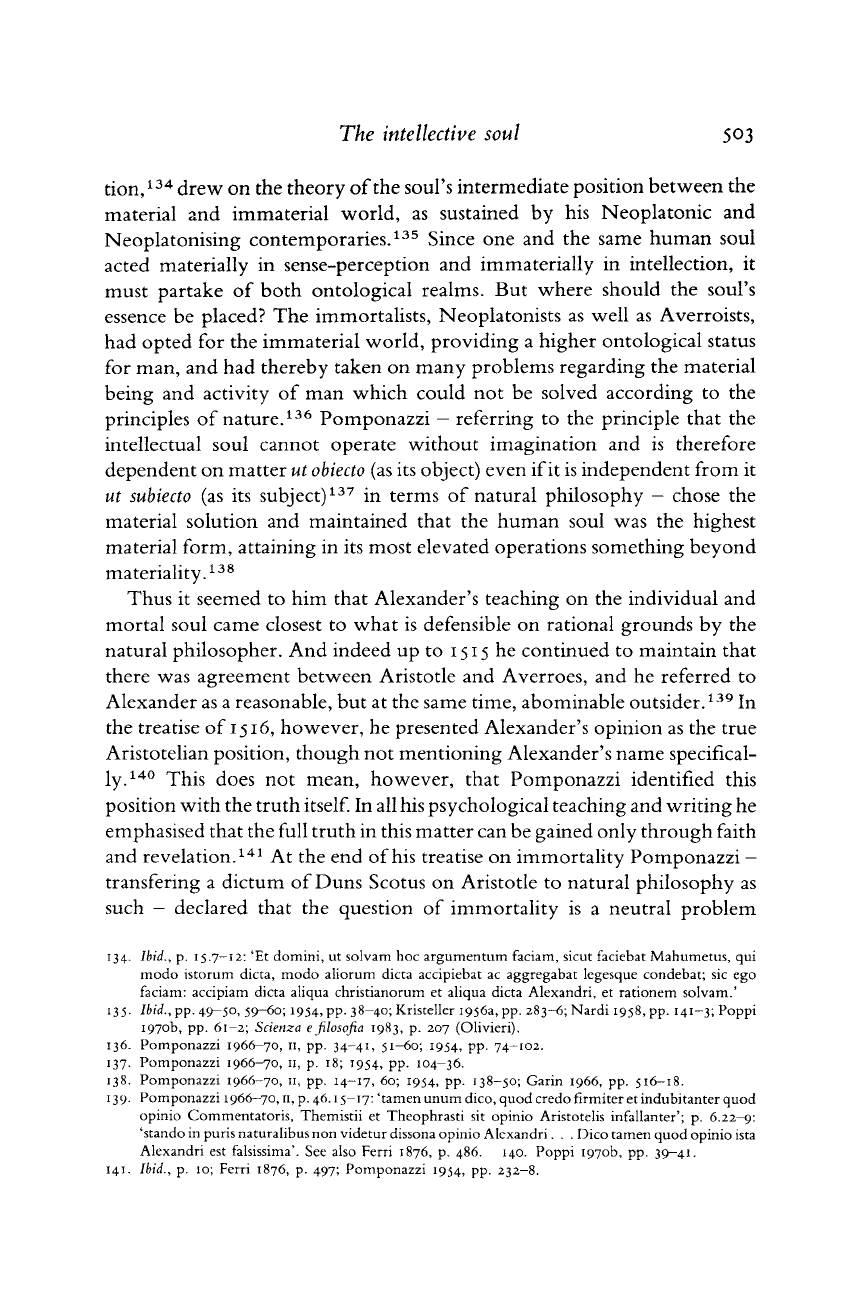
The
intellective soul
503
tion,
134
drew
on the
theory
of
the soul's intermediate position between
the
material
and
immaterial world,
as
sustained
by his
Neoplatonic
and
Neoplatonising
contemporaries.
135
Since
one and the
same human soul
acted materially
in
sense-perception
and
immaterially
in
intellection,
it
must partake
of
both ontological realms.
But
where should
the
soul's
essence
be
placed?
The
immortalists, Neoplatonists
as
well
as
Averroists,
had opted
for the
immaterial world, providing
a
higher ontological status
for
man, and had
thereby taken
on
many problems regarding
the
material
being
and
activity
of man
which could
not be
solved according
to the
principles
of
nature.
136
Pomponazzi
—
referring
to the
principle
that the
intellectual soul cannot operate without imagination
and is
therefore
dependent
on
matter
ut
obiecto
(as its
object) even
if
it
is
independent from
it
ut subiecto
(as its
subject)
137
in
terms
of
natural philosophy
—
chose
the
material solution
and
maintained
that the
human soul
was the
highest
material form, attaining
in its
most elevated operations something beyond
materiality.
138
Thus
it
seemed
to him that
Alexander's teaching
on the
individual
and
mortal soul came closest
to
what
is
defensible
on
rational grounds
by the
natural philosopher.
And
indeed
up to
1515
he
continued
to
maintain
that
there
was
agreement between Aristotle
and
Averroes,
and he
referred
to
Alexander
as a
reasonable,
but at the
same time, abominable outsider.
139
In
the treatise
of
1516,
however,
he
presented Alexander's opinion
as the true
Aristotelian
position, though
not
mentioning Alexander's name specifical-
ly.
140
This does
not
mean, however,
that
Pomponazzi identified this
position with
the truth
itself
In
all his
psychological
teaching
and
writing
he
emphasised
that the
full
truth in
this matter
can be
gained only through faith
and revelation.
141
At the end of
his treatise
on
immortality Pomponazzi
—
transfering
a
dictum
of
Duns Scotus
on
Aristotle
to
natural philosophy
as
such — declared
that the
question
of
immortality
is a
neutral problem
134. Ibid.,
p.
15.7—12:
'Et domini, ut solvam hoc argumentum faciam, sicut faciebat Mahumetus, qui
modo istorum dicta, modo aliorum dicta accipiebat ac aggregabat legesque condebat; sic ego
faciam:
accipiam dicta aliqua christianorum et aliqua dicta Alexandri, et rationem solvam.'
135. Ibid.,
pp.
49-50, 59-60;
1954, pp.
38-40;
Kristeller 1956a, pp.
283-6;
Nardi 1958, pp.
141-3;
Poppi
1970b,
pp. 61-2;
Scienza
e
Jilosofia
1983, p. 207 (Olivieri).
136.
Pomponazzi 1966-70, 11, pp. 34-41, 51-60; 1954, pp. 74-102.
137.
Pomponazzi 1966-70, 11, p. 18; 1954, pp. 104-36.
138.
Pomponazzi 1966-70, 11, pp.
14-17,
60; 1954, pp. 138-50; Garin 1966, pp.
516-18.
139.
Pomponazzi
1966—70,11,
p.
46.15-17:
'tamen unum dico, quod credo firmiter et indubitanter quod
opinio Commentatoris, Themistii et Theophrasti sit opinio Aristotelis infallanter'; p.
6.22—9:
'stando in puris naturalibus non videtur dissona opinio Alexandri . . . Dico tamen quod opinio ista
Alexandri
est falsissima'. See
also
Ferri 1876, p. 486. 140. Poppi 1970b, pp. 39-41.
141.
Ibid.,
p. 10; Ferri 1876, p. 497; Pomponazzi 1954, pp. 232-8.
Cambridge Histories Online © Cambridge University Press, 2008
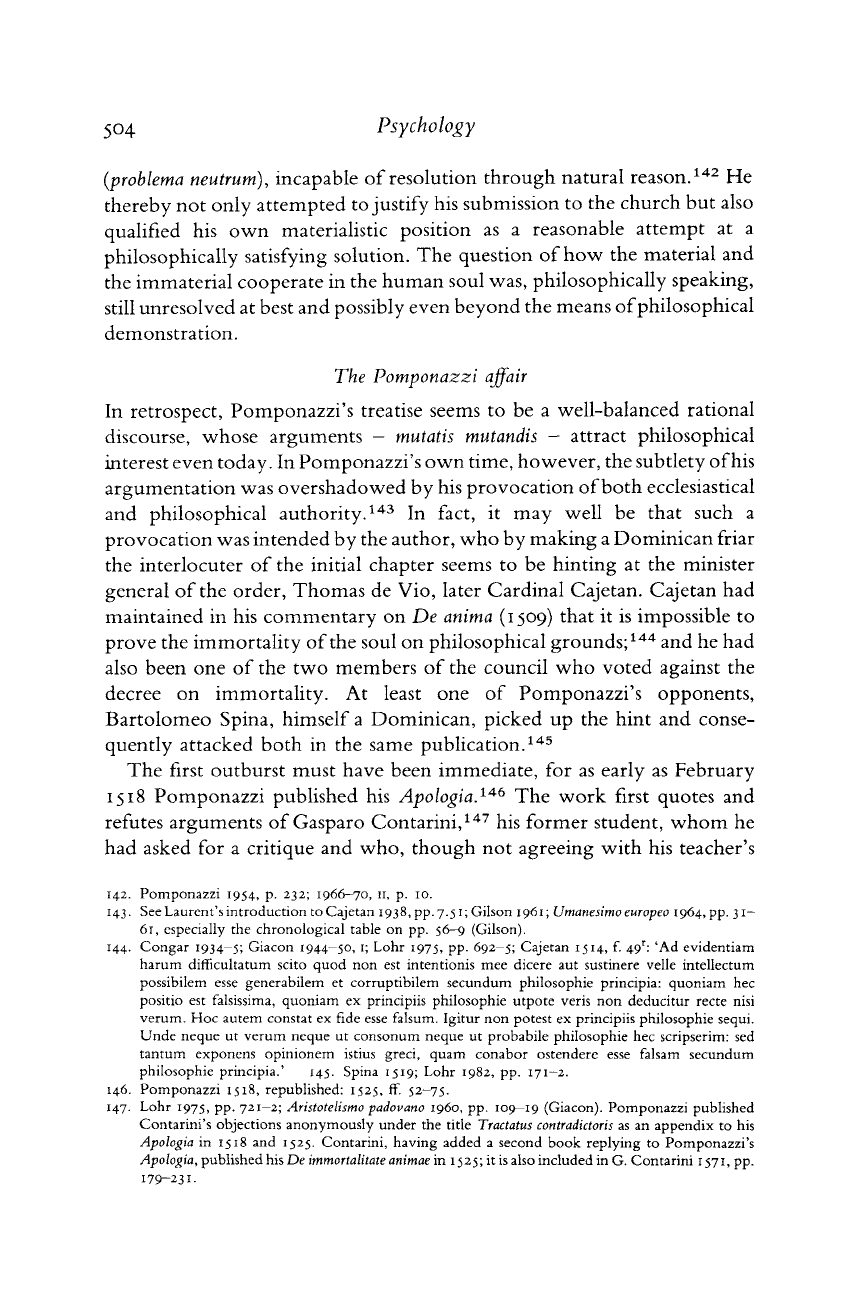
504
Psychology
(problema
neutrum),
incapable
of
resolution through natural reason.
142
He
thereby
not
only attempted to justify
his
submission
to the
church
but
also
qualified
his own
materialistic position
as a
reasonable attempt
at a
philosophically
satisfying solution.
The
question
of
how
the
material
and
the immaterial cooperate
in the
human soul was, philosophically speaking,
still
unresolved
at
best
and
possibly even beyond
the
means
of
philosophical
demonstration.
The Pomponazzi affair
In retrospect, Pomponazzi's treatise seems
to be a
well-balanced rational
discourse, whose arguments —
mutatis
mutandis
— attract philosophical
interest even today.
In
Pomponazzi's own time, however,
the
subtlety
of
his
argumentation was overshadowed
by his
provocation
of
both ecclesiastical
and philosophical authority.
143
In
fact,
it may
well
be
that
such
a
provocation was intended
by the
author, who
by
making
a
Dominican friar
the interlocuter
of the
initial chapter seems
to be
hinting
at the
minister
general
of the
order, Thomas
de
Vio, later Cardinal Cajetan. Cajetan
had
maintained
in his
commentary
on De
anima (1509)
that
it is
impossible
to
prove
the
immortality
of
the soul
on
philosophical grounds;
144
and he had
also been
one of the two
members
of the
council
who
voted against
the
decree
on
immortality.
At
least
one of
Pomponazzi's opponents,
Bartolomeo Spina, himself
a
Dominican, picked
up the
hint
and
conse-
quently attacked both
in the
same publication.
145
The
first outburst must have been immediate,
for as
early
as
February
1518
Pomponazzi published
his
Apologia.
146
The
work first quotes
and
refutes arguments
of
Gasparo Contarini,
147
his
former student, whom
he
had asked
for a
critique
and who,
though
not
agreeing with
his
teacher's
142.
Pomponazzi 1954, p. 232; 1966—70, 11, p. 10.
143.
See Laurent's introduction to
Cajetan
1938, pp.
7.51;
Gilson 1961;
Umanesimo europeo
1964, pp. 31—
61,
especially the chronological table on pp. 56-^9 (Gilson).
144.
Congar
1934-5; Giacon 1944-50, 1;
Lohr
1975, pp. 692-5;
Cajetan
1514, f. 49
r
: 'Ad evidentiam
harum
dimcultatum scito quod non est intentionis mee dicere aut sustinere velle intellectum
possibilem
esse
generabilem et corruptibilem secundum philosophic principia: quoniam hec
positio est falsissima, quoniam ex principiis philosophic utpote veris non deducitur recte
nisi
verum.
Hoc autem constat ex fide
esse
falsum. Igitur non potest ex principiis philosophic sequi.
Unde
neque ut verum neque ut consonum neque ut probabile philosophic hec scripserim: sed
tantum
exponens opinionem
istius
greci, quam conabor ostendere
esse
falsam secundum
philosophic principia.' 145. Spina 1519;
Lohr
1982, pp.
171-2.
146.
Pomponazzi 1518, republished: 1525, ff.
52—75.
147.
Lohr
1975, pp.
721—2; Aristotelismo padovano
i960,
pp. 109-19 (Giacon). Pomponazzi published
Contarini's
objections anonymously under the title
Tractatus contradictoris
as an appendix to his
Apologia
in 1518 and 1525. Contarini, having added a second book replying to Pomponazzi's
Apologia,
published his De
immortalitate
animae
in 1525; it is also included in G. Contarini
1571,
pp.
179-231-
Cambridge Histories Online © Cambridge University Press, 2008
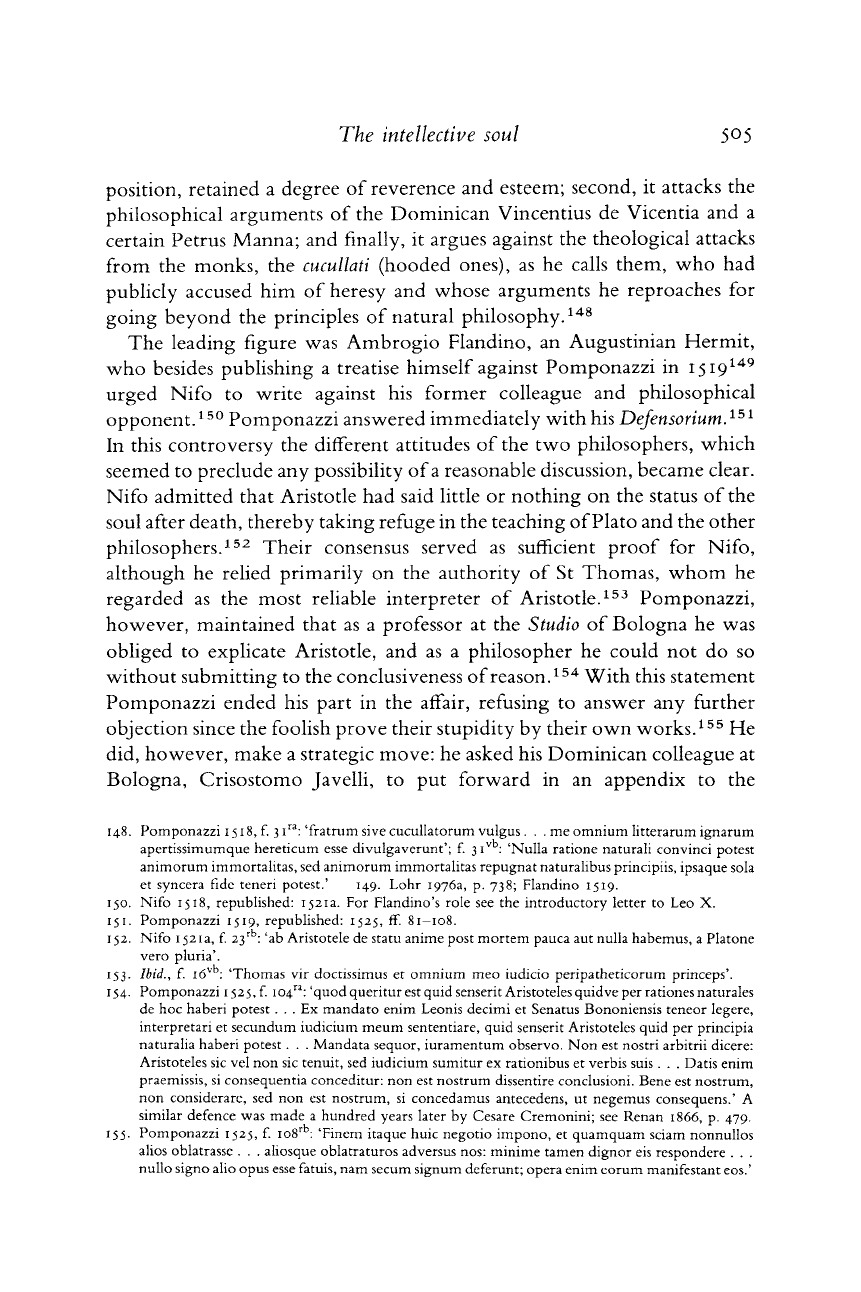
The intellective soul
505
position, retained
a
degree
of
reverence
and
esteem; second,
it
attacks
the
philosophical arguments
of the
Dominican Vincentius
de
Vicenda
and a
certain Petrus Manna;
and
finally,
it
argues against
the
theological attacks
from
the
monks,
the
cuculiati (hooded ones),
as he
calls them,
who had
publicly
accused
him of
heresy
and
whose arguments
he
reproaches
for
going
beyond
the
principles
of
natural
philosophy.
148
The
leading figure
was
Ambrogio Flandino,
an
Augustinian Hermit,
who
besides publishing
a
treatise himself against Pomponazzi
in
1519
149
urged
Nifo
to
write against
his
former colleague
and
philosophical
opponent.
150
Pomponazzi answered immediately with
his
Defensorium.
151
In this controversy
the
different
attitudes
of the two
philosophers, which
seemed
to
preclude
any
possibility
of
a reasonable discussion, became clear.
Nifo
admitted
that
Aristotle
had
said little
or
nothing
on the
status
of the
soul after death, thereby taking refuge
in the
teaching
of
Plato
and the
other
philosophers.
152
Their consensus served
as
sufficient proof
for
Nifo,
although
he
relied primarily
on the
authority
of St
Thomas, whom
he
regarded
as the
most reliable
interpreter
of
Aristotle.
153
Pomponazzi,
however,
maintained
that
as a
professor
at the
Studio
of
Bologna
he was
obliged
to
explicate Aristotle,
and as a
philosopher
he
could
not do so
without submitting
to the
conclusiveness
of
reason.
154
With this statement
Pomponazzi ended
his
part
in the
affair, refusing
to
answer
any
further
objection since
the
foolish prove their stupidity
by
their
own
works.
155
He
did, however, make
a
strategic move:
he
asked
his
Dominican colleague
at
Bologna,
Crisostomo Javelli,
to put
forward
in an
appendix
to the
148.
Pomponazzi 1518, f.
31
ra
:'fratrum
si ve cucullatorum vulgus. . . me omnium litterarum ignarum
apertissimumque hereticum
esse
divulgaverunt'; f. 3i
vb
: 'Nulla ratione naturali convinci potest
animorum immortalitas, sed animorum immortalitas repugnat naturalibus principiis, ipsaque
sola
et syncera fide teneri potest.' 149.
Lohr 1976a,
p. 738; Flandino 1519.
150.
Nifo 1518, republished:
1521a.
For Flandino's role see the introductory letter to Leo X.
151.
Pomponazzi 1519, republished: 1525, ff. 81-108.
152.
Nifo
1521a,
f. 23
rb
: 'ab Aristotele de statu anime post mortem pauca aut nulla habemus, a Platone
vero pluria'.
153. Ibid.,
f. i6
vb
: 'Thomas vir doctissimus et omnium meo iudicio peripatheticorum princeps'.
154.
Pomponazzi 1525, f. 104": 'quod queritur est quid
senserit
Aristoteles quidve per rationes naturales
de hoc haberi potest ... Ex mandato enim Leonis decimi et Senatus Bononiensis teneor legere,
interpretari
et secundum iudicium meum sententiare, quid
senserit
Aristoteles quid per principia
naturalia
haberi potest . . .
Mandata
sequor, iuramentum observe Non est nostri arbitrii dicere:
Aristoteles sic vel non sic tenuit, sed iudicium sumitur ex rationibus et verbis
suis
. . . Datis enim
praemissis, si consequentia conceditur: non est nostrum dissentire conclusioni. Bene est nostrum,
non considerare, sed non est nostrum, si concedamus antecedens, ut negemus consequens.' A
similar defence was made a hundred years later by Cesare Cremonini; see Renan 1866, p. 479.
155.
Pomponazzi 1525, f.
io8
rb
:
'Finem itaque huic negotio impono, et quamquam sciam nonnullos
alios
oblatrasse . . . aliosque oblatraturos adversus nos: minime tamen dignor eis respondere . . .
nullo signo alio opus
esse
fatuis, nam secum signum deferunt; opera enim eorum manifestant eos.'
Cambridge Histories Online © Cambridge University Press, 2008
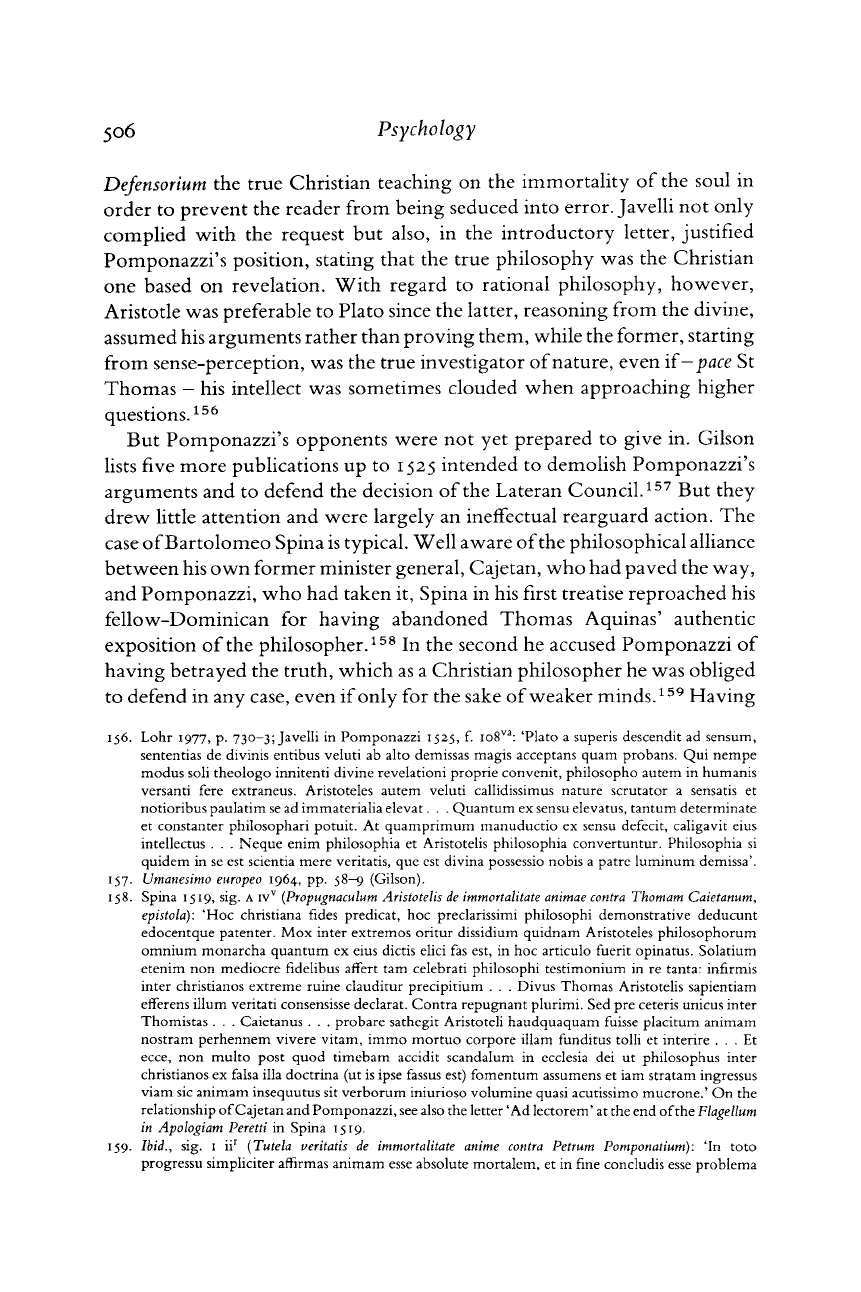
506
Psychology
Defensorium
the
true
Christian teaching
on the
immortality
of the
soul
in
order
to
prevent
the
reader from being seduced into error. Javelli
not
only
complied
with
the
request
but
also,
in the
introductory letter, justified
Pomponazzi's position, stating
that
the
true
philosophy
was the
Christian
one based
on
revelation. With regard
to
rational philosophy, however,
Aristotle
was preferable
to
Plato since
the
latter, reasoning from
the
divine,
assumed his arguments
rather
than
proving them, while
the
former, starting
from sense-perception,
was the
true
investigator
of
nature, even if—pace
St
Thomas
- his
intellect
was
sometimes clouded when approaching higher
questions.
156
But
Pomponazzi's opponents were
not yet
prepared
to
give
in.
Gilson
lists
five
more publications
up to
1525 intended
to
demolish Pomponazzi's
arguments
and to
defend
the
decision
of the
Lateran
Council.
157
But
they
drew little attention
and
were largely
an
ineffectual rearguard action.
The
case
of
Bartolomeo Spina is typical.
Well
aware
of
the philosophical alliance
between his own former minister general, Cajetan, who
had
paved
the
way,
and Pomponazzi,
who had
taken
it,
Spina
in his
first treatise reproached
his
fellow-Dominican
for
having abandoned Thomas Aquinas' authentic
exposition
of the
philosopher.
158
In the
second
he
accused Pomponazzi
of
having betrayed
the
truth,
which
as a
Christian philosopher
he
was obliged
to defend
in any
case, even
if
only
for the
sake
of
weaker
minds.
159
Having
156.
Lohr
1977, p. 730—3; Javelli in Pomponazzi 1525, f. io8
va
: 'Plato a superis descendit ad sensum,
sententias de divinis entibus veluti ab alto demissas magis acceptans quam probans. Qui nempe
modus
soli
theologo innitenti divine revelationi proprie convenit, philosopho autem in humanis
versanti fere extraneus. Aristoteles autem veluti callidissimus nature scrutator a
sensatis
et
notioribus paulatim se ad immaterialia elevat. . . Quantum ex
sensu
elevatus, tantum determinate
et constanter philosophari potuit. At quamprimum manuductio ex
sensu
defecit, caligavit
eius
intellectus . . . Neque enim philosophia et Aristotelis philosophia convertuntur. Philosophia si
quidem in se est scientia mere veritatis, que est divina
possessio
nobis a patre luminum demissa'.
157. Umanesimo europeo
1964, pp.
58—9
(Gilson).
158.
Spina 1519, sig. A iv
v
{Propugnaculum Aristotelis
de
immortalitate
animae contra
Thomam
Caietanum,
epistola):
'Hoc Christiana fides predicat, hoc preclarissimi philosophi demonstrative deducunt
edocentque patenter. Mox inter extremos oritur dissidium quidnam Aristoteles philosophorum
omnium monarcha quantum ex
eius
dictis elici fas est, in hoc articulo fuerit opinatus. Solatium
etenim non mediocre fidelibus affert tarn celebrati philosophi testimonium in re tanta: infirmis
inter christianos extreme mine clauditur precipitium . . . Divus Thomas Aristotelis sapientiam
efferens ilium veritati
consensisse
declarat.
Contra
repugnant plurimi. Sed pre ceteris unicus inter
Thomistas
. . . Caietanus . . . probare sathegit Aristoteli haudquaquam
fuisse
placitum animam
nostram perhennem vivere vitam, immo mortuo corpore illam funditus tolli et interire . . . Et
ecce, non multo post quod timebam accidit scandalum in ecclesia dei ut philosophus inter
christianos ex falsa ilia doctrina (ut is ipse fassus est) fomentum assumens et iam stratam ingressus
viam
sic animam insequutus sit verborum iniurioso volumine quasi acutissimo mucrone.' On the
relationship of
Cajetan
and Pomponazzi, see also the letter 'Ad lectorem' at the end of the
Flagellum
in Apologiam Peretti
in Spina 1519.
159. Ibid.,
sig. 1 ii
r
(Tutela
veritatis
de
immortalitate
anime contra Petrum Pomponatium):
'In toto
progressu simpliciter affirmas animam
esse
absolute mortalem, et in fine concludis
esse
problema
Cambridge Histories Online © Cambridge University Press, 2008
